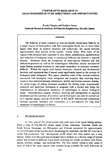| dc.contributor.author | Chopin, Frank | |
| dc.contributor.author | Inoue, Yoshihiro | |
| dc.date.accessioned | 2018-12-05T08:59:48Z | |
| dc.date.available | 2018-12-05T08:59:48Z | |
| dc.date.issued | 1997 | |
| dc.identifier.citation | Chopin, F., & Inoue, Y. (1997). Cooperative research in Asian fisheries-future directions and opportunities. In Proceeding of the Regional Workshop on Responsible Fishing, Bangkok, Thailand, 24-27 June 1997 (pp. 432-442). Samut Prakarn, Thailand: Training Department, Southeast Asian Fisheries Development Center. | en |
| dc.identifier.uri | http://hdl.handle.net/20.500.12067/772 | |
| dc.description.abstract | The fisheries of many countries in Asia are heavily reliant upon fisheries as a major source of food protein with fish consumption levels two to three times higher than those of western countries and collectively, the region harvests approximately forty percent of the world's marine fishes. With many of the region's fish resources fully exploited or over fished, identification, quantification and reduction of biological waste in commercial fisheries has become a regional priority. However, given the complexity of multi-species fisheries and fish utilization practices as well as the technological difficulties already encountered make finding practical solutions by individual researchers or institutes extremely difficult. Within the region exist human resources, research and development facilities and equipment that if shared could significantly speed up the process of biological waste mitigation. This paper, identifies some of the current problems associated with biological waste mitigation and proposes that resolving these issues is best achieved through information, facility and human resource sharing. An initial target of setting minimum standards for fishing trials, experimental protocols and analytical techniques is proposed with a second step being the establishment of information databases of technologies to reduce biological waste. Administrative support, strategic planning and management of regional databases and the activities of scientists and technologists can only be carried out by a regional agency such as SEAFDEC or ICLARM. International cooperation between agencies, institutes and researchers is a pre-requisite for long term resolution of technological problems. | en |
| dc.language.iso | en | en |
| dc.publisher | Training Department, Southeast Asian Fisheries Development Center | en |
| dc.title | Cooperative Research in Asian Fisheries-future Directions and Opportunities | en |
| dc.type | Conference paper | en |
| dc.citation.spage | 432 | |
| dc.citation.epage | 442 | |
| dc.subject.asfa | international cooperation | en |
| dc.subject.asfa | International organizations | en |
| dc.subject.asfa | fishery institutions | en |
| dc.subject.asfa | Fishery development | en |
| dc.subject.asfa | Fishery organizations | en |
| dc.subject.asfa | research programmes | en |
| dc.subject.asfa | fishery management | en |
| dc.subject.asfa | Planning | en |
| dc.subject.asfa | sustainable fishing | en |
| dc.subject.asfa | sustainability | en |
| dc.citation.conferenceTitle | Proceedings of the Regional Workshop on Responsible Fishing, Bangkok, Thailand, 24-27 June 1997 | en |

